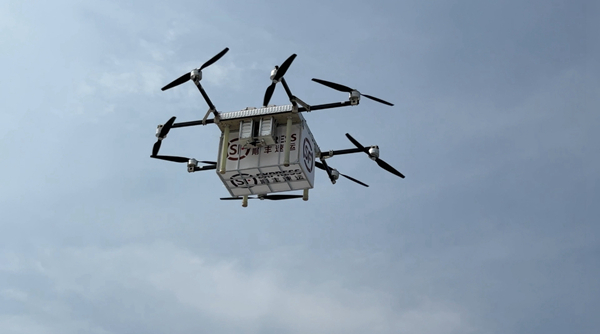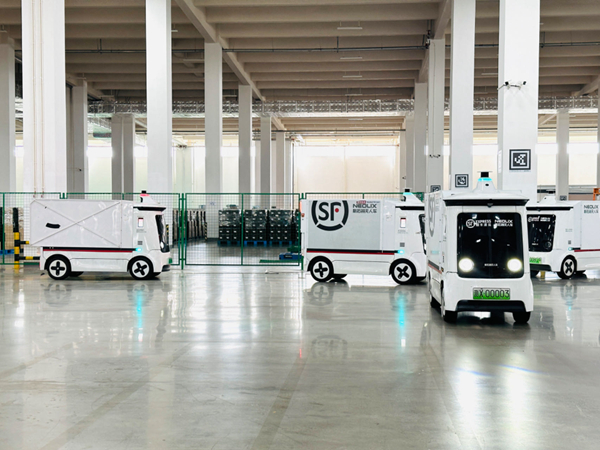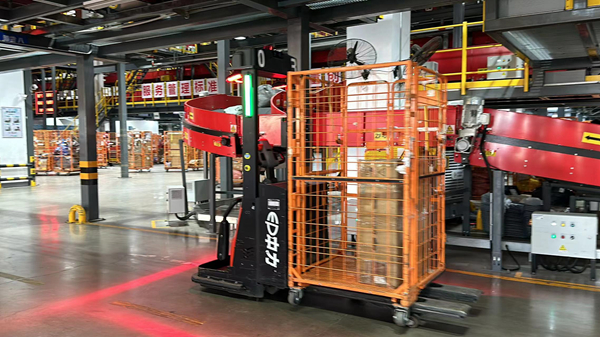Here comes your parcel, and unmanned delivered
As the “June 18 Shopping Carnival” stretches about a month this year, Jiangsu has reported a nearly 20% increase in parcel volume, handling close to 2 billion parcels from May 20 to June 16. Thanks to intelligent advancements, the express delivery sector has smoothly managed this peak period without significant logistical disruptions.
Innovation with drone delivery of loquats

(Liu Xia/Xinhua Daily)
Several cities in Jiangsu are now regularly using drones for delivery services. In April, Wuxi inaugurated its low-altitude drone delivery service, followed by Suzhou in May. These digital and intelligent technologies are significantly enhancing efficiency at multiple stages of the express delivery chain.
Suzhou's loquats became highly sought after in May. Following the harvest starting May 20, SF Express recorded a doubling in loquat parcel volumes compared to last year. The company increased delivery speeds, achieving intra-city deliveries within half a day, 6-hour deliveries to Shanghai and other cities in Jiangsu and Zhejiang provinces.
This efficiency was supported by conducting 10 drone flights daily. SF Express runs its drone delivery from the Wujiang distribution center, where drones take off from a rooftop helipad and start the predetermined route at an altitude of 120 meters. The center’s head Ran Fubing said that this drone route with about 8 flights daily has been operating regularly since May 8, marking Suzhou's first drone delivery service.
Previously, local farmers like Ye Zhongping transported loquats manually downhill before packing. Now, drones can expedite this process by directly transporting boxed loquats to the distribution center.
Ran also disclosed that the center is set to operate six new routes and plans to deploy large drones capable of carrying 500 kilograms to 1.5 tons over distances of up to 400 kilometers, potentially replacing some road transport.
Advancements with unmanned delivery vehicles

At the Wujiang center, dozens of unmanned white vehicles are lined up for operations. Workers need only two steps to load package containers onto these vehicles, which then autonomously trave up to 15 kilometers to distribution sites and unload themselves.
Currently, the center operates 62 unmanned vehicles regularly, as companies like SF Express and STO expand their usage throughout Jiangsu. These vehicles are increasingly common in rural areas, university campuses, and urban streets. They help reduce costs and increase delivery efficiency, especially in short-distance transport – traditionally the most costly part of delivery logistics.
According to Ran, each vehicle can travel 120 kilometers on a full charge, with electricity costs amounting to just a few yuan. This makes unmanned delivery not only eco-friendly and but also cost-efficient, justifying its broader adoption.
"Smart brain" boosts delivery speed

Unlike traditional distribution centers cluttered with parcels, the Wujiang center has transformed into a hub of smart technology. Here, one AGV can handle up to 110 containers daily with minimal human intervention, completely eliminating the need for manual forklifts.
Yang Yuexin, director of the Suzhou Municipal Postal Administration, highlighted that standardized carts, which replace woven bags, can be used indefinitely and are well suited for integration with unmanned vehicles, drones, and AGVs.
However, some industry insiders note that express delivery companies vary in the extent and quality of their intelligent transformations, facing challenges such as computing power and cost of customized services. They are encouraged to cooperate with companies specializing in digitalization to promote comprehensive intelligent transformations from pickup to delivery.